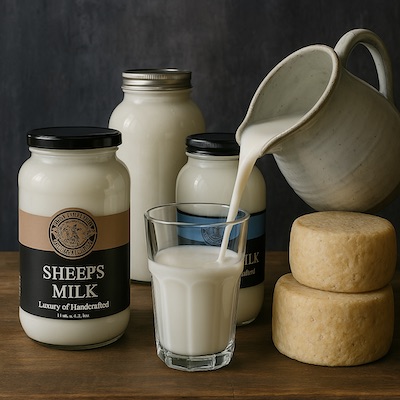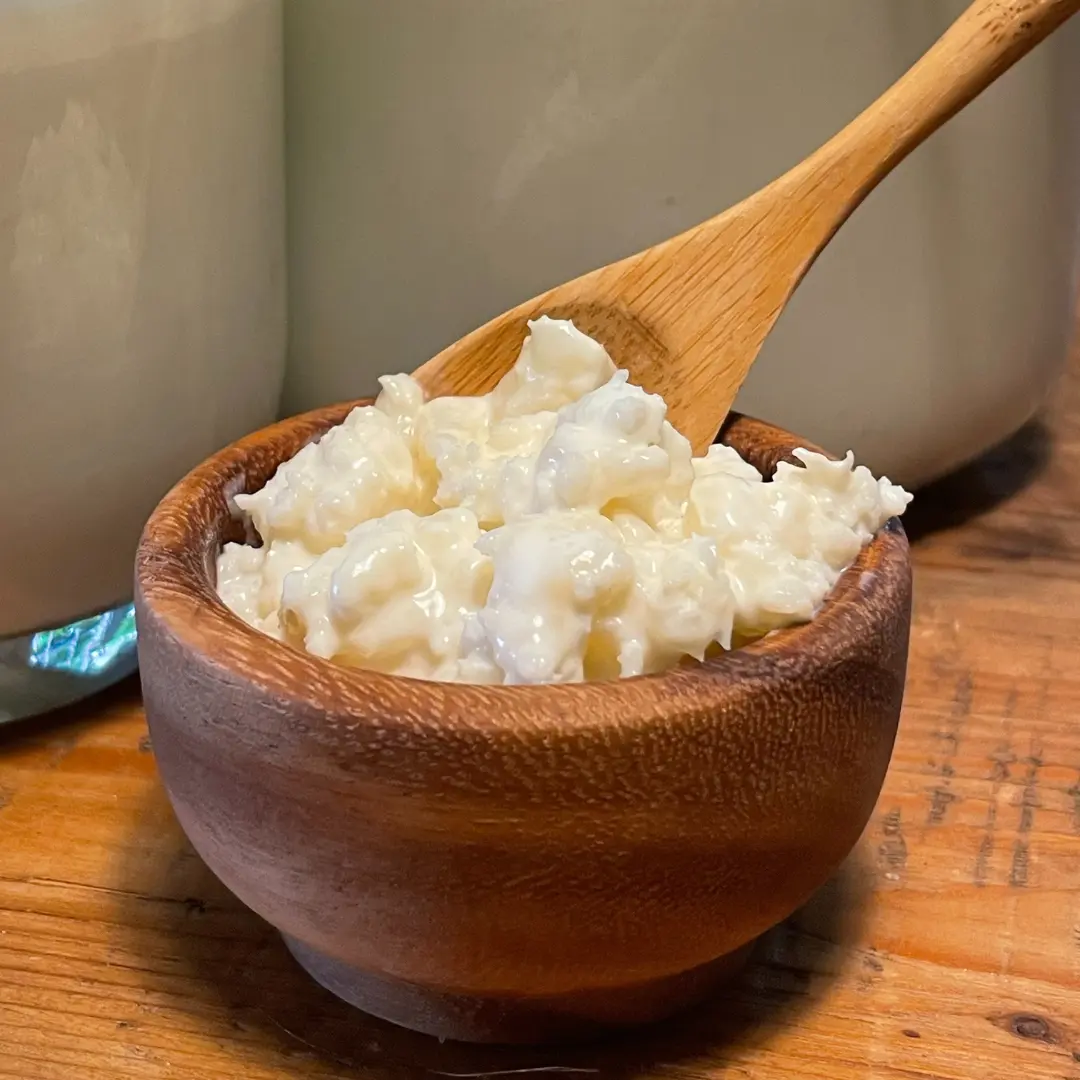The Mysterious Origins of Kefir: Myths, Miracles, and Milk
Long before scientists studied bacteria or probiotics, people across the ancient world shared remarkable stories about a healing drink called kefir. From the highlands of the Caucasus to the pages of the Bible, kefir grains were believed to be more than just a tool for fermentation—they were a gift.
The Grains of the Prophet
One of the most well-known legends says the first kefir grains were a gift from God, blessed by the Prophet Mohammed. According to this story, the Prophet gave the grains to Orthodox Christian tribes in the Caucasus Mountains, instructing them to guard the secret carefully. The grains were considered sacred—“the grains of the Prophet”—and believed to hold healing power. Sharing them outside the tribe was forbidden, as it was thought the blessing would be lost. For centuries, this gift was passed down in silence, treasured as a divine key to strength, health, and long life.
Monks, River Barrels, and Miraculous Fermentation
One folk tale describes monks cleaning milk barrels by rinsing them in a cool river. The next day, one barrel of milk turned tangy, but did not spoil. The monks tasted it and found it healthy and refreshing. They realized the milk at the river’s edge had fermented naturally. That fermented milk was the earliest kefir in practice. This miraculous brew soon became known as a kefir starter, revered for its gut‑soothing power. It was considered sacred in the monastic community, and the method spread from monastery to village by word of mouth.
Manna from Heaven: Kefir’s Divine Origins
In some traditions, kefir grains were called “manna from heaven.” The story goes that after times of hardship, nomads discovered mysterious white clumps in fermented milk left in their goatskin bags. This miraculous milk gave strength, healed stomach troubles, and lasted longer than fresh milk. The nomads believed it was a divine gift meant to protect and sustain them. The grains were guarded carefully, passed down like a family treasure. In this version, kefir wasn’t just food—it was a blessing from above.
Abraham’s Longevity and the Grains of Life
Another legend links kefir to the Biblical patriarch Abraham. It’s said that he lived so long and remained so strong thanks to a special drink made from milk and kefir grains. These grains, passed down from generation to generation, were called the grains of life. They were thought to bring strength, wisdom, and even favor from God. This story reinforced the belief that kefir was more than nutrition—it was almost sacred.
Kefir’s Journey: From Guarded Secret to Worldwide Fame
For many generations, kefir remained isolated in its native region. That changed in the early 20th century, thanks to an unlikely series of events. Russian doctors, intrigued by reports of Caucasus longevity and encouraged by Nobel Prize-winning scientist Élie Metchnikoff’s writings on fermented dairy, were eager to obtain kefir grains for use in treating patients.
In 1908, the All-Russian Physicians’ Society tasked the Blandov brothers, owners of a Moscow dairy, with acquiring these grains at any cost. What followed was a real-life adventure. The Blandovs sent a young employee named Irina Sakharova to the court of a local prince in the Caucasus, hoping she could charm him into gifting some kefir starter culture.
Kidnapped for Kefir
The mission took a dramatic turn when the prince, enamored with Irina, refused to part with the secret and instead abducted her, intending to force her into marriage. Irina was rescued, and she appealed to the Tsar for justice. The outcome? The prince was ordered to compensate her not with gold or jewels, but with what she truly sought – an enormous reward of kefir grains. She returned to Moscow with 10 pounds of kefir grains in tow, finally unlocking the secret for Russia.
Soon after, kefir production began in Russia using the newly acquired grains. Physicians started using kefir as a medicinal drink in hospitals, treating digestive disorders, tuberculosis, atherosclerosis, and even cancer.
By the 1930s, kefir was being produced on a large scale to meet growing demand across the Soviet Union. Kefir had effectively gone from a local secret to a national phenomenon. It spread beyond Russia’s borders by the mid-20th century, reaching Western Europe, North America, and beyond. Today, kefir is a globally popular fermented drink, found in supermarkets and health food stores worldwide. What was once made in goat hides in a mountain village is now bottled and sold on every continent – a testament to its enduring appeal.
Kefir: A Traditional Gut Healer
Even before formal research, people observed that kefir had remarkable healing properties, especially for the digestive system. In its homeland, kefir was prized as a folk remedy for stomach ailments. Drinking kefir daily was believed to soothe the gut, improve digestion, and restore strength after illness. The long-lived mountain villagers often credited their vitality to their daily cup of kefir. Russian doctors quickly embraced these traditional claims. Once kefir became available outside the Caucasus, it was used therapeutically in clinics and sanatoriums. Doctors in early 20th-century Russia gave kefir to patients suffering from gastrointestinal problems, with notable success.
Kefir gained a reputation as a natural probiotic tonic that could rebalance intestinal flora and relieve issues like diarrhea or ulcers. It was even administered to convalescent infants and the elderly to improve their nutrition and immunity. This “miracle milk” was not just an anecdote – it produced tangible improvements in health long before antibiotics or modern probiotics existed. Generations of people grew up knowing that a glass of kefir could calm an upset stomach or aid recovery from illness. In essence, kefir was an early probiotic: a living medicine in a glass. Its ability to heal the gut and promote wellness was cherished in traditional cultures, paving the way for the scientific interest that would come later.
Modern Research Validates Kefir’s Benefits
In recent decades, scientists have turned their attention to kefir, and their findings confirm what tradition held true. Research shows that kefir is packed with probiotics – live beneficial microbes – in greater diversity and quantity than most other fermented foods. In fact, kefir grains contain up to 100 strains of bacteria and yeasts. That makes kefir a much more potent source of probiotics than yogurt. Thanks to this rich microbiome, many consider kefir the healthiest probiotic beverage in the world.
Modern studies have documented a wide array of health benefits from regular kefir consumption. These include improved digestion and gut health, better cholesterol and blood pressure levels, a stronger immune system, and even anti-cancer properties. For example, one review noted that kefir intake was associated with enhanced digestion and could help reduce cholesterol and blood pressure, as well as allergies and asthma.
Another study highlighted kefir’s unique probiotic strain Lactobacillus kefiri, which can inhibit harmful bacteria like Salmonella and E. coli, thereby protecting against infections. Such findings back up kefir’s age-old reputation as a gut-healing elixir and extend its benefits to overall wellness.
It’s not just laboratory results – nutrition experts also sing kefir’s praises. Kefir is high in vitamins, minerals, and protein, but low in lactose (milk sugar) due to fermentation. Its probiotics can help balance the intestinal flora and have been linked to reduced inflammation in the body. Research indicates that drinking kefir may alleviate various digestive disorders and even improve lactose digestion for those who are lactose intolerant.
Modern Superfood
With its mix of bioactive compounds, kefir has earned the label of a “superfood” in the modern health community. To put it simply, what traditional wisdom believed has now been largely confirmed by science. Kefir stands out for its wealth of beneficial probiotic bacteria, which support gut health and strengthen immunity. Health professionals often recommend adding fermented foods like kefir to one’s daily diet for these reasons. Remarkably, a beverage invented thousands of years ago aligns so well with cutting-edge nutritional science today.
Notable Health Benefits of Kefir, as supported by research:
- Supports a balanced gut microbiome and aids digestion.
- It can reduce antibiotic-associated diarrhea and symptoms of IBS (irritable bowel syndrome).
- Lowers cholesterol and may help control blood pressure.
- Strengthens the immune system’s response to infections.
- Shows anti-carcinogenic effects in lab studies (e.g., slowing tumor growth).
- Improves lactose digestion and is generally well-tolerated even by the lactose-intolerant.
In summary, kefir’s status as a probiotic powerhouse is now well-established. From improving gut health to boosting overall immunity, this ancient drink truly earns its reputation as one of the world’s healthiest probiotics.
Kefir Grains: Nature’s Probiotic Starter
Living kefir grains look like small, white cauliflower florets. These soft, jelly-like clumps are colonies of friendly bacteria and yeast working together. They are the kefir starter culture used to ferment fresh milk into tangy, probiotic kefir.
Despite the name, kefir grains aren’t actual grains like wheat or rice. They are living clusters of microbes held together in a matrix of proteins, lipids, and sugars. Each grain is a rubbery, gelatinous nugget that might remind you of cottage cheese or cauliflower in appearance. These grains are the “engine” of traditional kefir fermentation – you add them to milk, and over about 24 hours, they ferment the milk into kefir, then you strain out the grains and use them again for the next batch. In other words, kefir grains are a reusable kefir starter culture, passed down from batch to batch.
The Microbial Harmony of Kefir Grains
Kefir grains contain an astounding variety of microorganisms living in harmony. This symbiotic community includes lactic acid bacteria (like those found in yogurt), yeasts, and other beneficial microbes. Together, they feast on the lactose in milk and produce lactic acid, carbon dioxide, vitamins, and enzymes. All the good stuff that makes kefir so healthy. Because of this fermentation, kefir is 99.9% lactose-free and full of gut-friendly bacteria. The grains themselves grow and multiply with each batch, and surplus grains can be shared with friends or even used to ferment other foods.
It’s important to note that kefir grains are not consumed on their own. They are not an ingredient in the drink, but rather the starter culture. While technically edible, they are rubbery and tart, and most people simply reuse them to make more kefir. In fact, kefir grains can live indefinitely if cared for (regularly fed with fresh milk). This makes them very economical and sustainable compared to single-use powdered kefir starter packets. Unlike direct-set powdered cultures, which contain only a few strains, authentic kefir grains harbor a much broader spectrum of probiotics. This rich diversity is what gives traditional kefir its superior health benefits. Little wonder that kefir grains have been treasured in families for generations – they are essentially a living heirloom of health.
Kefir Cheese: A Forgotten Tradition
We usually think of kefir as a drink, but it can also be made into cheese! In traditional dairying cultures, kefir was sometimes allowed to ferment milk that would then be strained or further dried into a type of cheese. For example, if you take thickened kefir and strain it through cheesecloth, you get a creamy, tangy soft cheese (much like a Middle Eastern labneh or a cream cheese spread). This kefir cheese is rich in probiotics and has a distinctive zing from the fermentation.
Beyond soft cheeses, kefir has historically been used as a cheese starter culture in place of or alongside standard cheese cultures. Cheesemakers in certain regions experimented with adding kefir grains or kefir itself to milk to produce unique cheeses. This practice largely faded with the advent of commercial pure cultures.
Lactose-free cheeses
Still, it’s now being rediscovered by artisanal producers who value the complexity of flavor and health benefits that kefir cultures bring. Using kefir in cheesemaking is a long-forgotten traditional method that infuses the cheese with a robust microbiome. One big advantage of kefir-based cheesemaking is that it naturally produces a lactose-free cheese. During fermentation, the kefir microbes consume the lactose (milk sugar) as their fuel. By the time the cheese is ready, very little to no lactose remains. That means even people with lactose intolerance can often enjoy kefir-fermented cheeses without trouble.
The result is a cheese that is easier to digest, potentially probiotic, and full of rich, tangy flavor. It’s truly a marriage of cheesemaking and fermentation traditions. Today, however, kefir cheese is rarely found in stores – it’s mostly the realm of home fermenters or specialty farms. Making cheese with kefir grains requires time, patience, and a deep respect for old-world methods. Fortunately, a few dedicated artisans are keeping this tradition alive, much to the delight of adventurous cheese lovers and health-conscious eaters.
Secret Lands Farm: Keeping Kefir Tradition Alive
At Secret Lands Farm, we are proud to be among the very few producers in the world still crafting kefir-fermented cheeses the traditional way. Our farm, based in Ontario, Canada, uses authentic kefir grains to culture our sheep’s milk, creating truly one-of-a-kind artisan cheeses. These kefir cheeses are fermented naturally, then aged to perfection, yielding a tangy, nutrient-rich cheese that is lactose-free and teeming with beneficial microbes.
This is the old-fashioned art of cheesemaking – no freeze-dried packets of laboratory bacteria, but a living kefir starter passed down and cared for over time. The result is a cheese with depth of flavor and proven gut health benefits, a genuine product of tradition and nature. We invite you to explore our range of kefir products – from our creamy sheep’s milk kefir (a delightful probiotic drink) to our exclusive kefir-aged cheeses.
You can even take home a piece of this heritage: we offer our own family of kefir grains for sale, so you can learn to make your own authentic kefir at home. (These live grains are essentially a kefir starter kit that keeps on giving!)
Do keep in mind, however, that we ship our products only in Canada. So if you’re looking for kefir grains near me and you’re in Canada, Secret Lands Farm has you covered with fresh, active cultures ready to start you on your fermentation journey. Yes, please join us in keeping this ancient tradition alive. Discover for yourself the legendary drink that can help heal your gut and delight your taste buds. From its storied origin in the Caucasus mountains to your kitchen here in Canada, kefir’s journey continues – and you can be a part of the next chapter!




